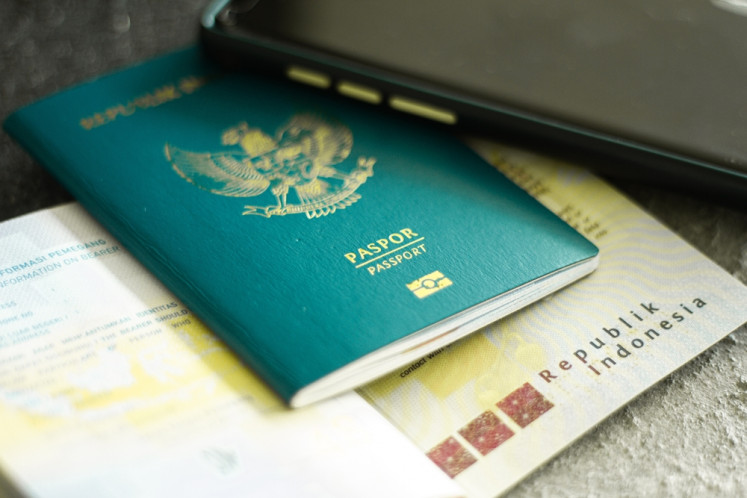COVID-19 and business: Is force majeure an option?
The COVID-19 pandemic has caused significant economic disruptions
Change Size

T
he COVID-19 pandemic has caused significant economic disruptions. Governments, in an effort to check the spread of the virus, have implemented policies that have disrupted business operations globally.
In Jakarta, the government has declared a state of emergency and urged businesses to close their offices or at the very least reduce the number of employees working in the office.
This will likely, if it has not already, cause contracts and transactions to be delayed or canceled. This article discusses the repercussions of COVID-19 on contracts in Indonesia, the concept and implementation of force majeure clauses, and the ability of defaulting parties to avoid liability.
What is force majeure?
Force majeure clauses are contractual clauses that alter parties’ obligations and/or liabilities under a contract in the event that an extraordinary event or circumstance beyond their control prevents one or more of
the parties from fulfilling those obligations.
If the contract provides a detailed force majeure clause, the terms of that clause will generally prevail. A well-drafted force majeure clause would usually include:
• A clear description of what matters constitute a force majeure event. In order to accommodate the impact of COVID-19, wording such as “pandemic” or “outbreak” should be included.
• The consequences of the occurrence of a force majeure event. For example, will it delay the object of the agreement, or terminate it, and who will be liable for any costs incurred as a result of the force majeure.
• Procedures to be taken upon the occurrence of a force majeure event.
However, regardless of whether a contract contains such a clause, force majeure can still be applied by reason of law. In light of COVID-19, a company’s nonperformance may still be excused if it can successfully argue in court that COVID-19 is a force majeure event and is able to prove that there is a direct causal link between the pandemic and its nonperformance.
One may certainly argue that the pandemic is an unexpected event that could neither have been anticipated nor avoided. And it can certainly be regarded as an impediment to business operations worldwide.
Nonetheless, it may be difficult to use COVID-19 to claim force majeure in the absence of government policies such as travel restrictions or lockdowns that have created impediments to business operations, because it would be difficult to determine at what point exactly COVID-19 could be categorized as a force majeure event.
For example, if the government enacted a citywide lockdown and ordered companies to halt business operations, and during the lockdown a business failed to perform its contractual obligations, it is clear that COVID-19 could be categorized as a force majeure event during such period.
The party claiming force majeure will want to show that any failure to perform its contractual obligations was beyond its control and that it could not have otherwise prevented or mitigated the damage from such failure.
We would suggest parties seeking to invoke force majeure for nonperformance take reasonable steps to mitigate the foreseeable damages brought about by the nonperformance, to strengthen its case in legal proceedings.
In this regard, companies should ensure that all the impacts of COVID-19, as well as the companies’ actions in response to such impacts, are documented. These records may be crucial to support the claim that the company took steps to mitigate the damages in the event of nonperformance.
We also encourage all businesses looking to invoke force majeure to show that they are still acting in good faith by complying with all the other requirements of the contract.
There is no doubt the COVID-19 pandemic has presented unprecedented challenges and impediments to businesses in conducting their normal operations. It is imperative that businesses enact policies and measures to protect themselves during this time. We suggest several measures companies can take in this situation.
• Review all business contracts and identify what events are regulated as force majeure, the remedies provided in the event of force majeure, as well as the requirements to invoke force majeure if operations are disrupted by the effects of COVID-19.
• Include wording or provisions on infectious disease/pandemic in new contracts and amend existing contracts if possible.
• Identify and assess the consequences of the non-performance of all valid contracts.
• Ensure that all reasonable steps are taken to avoid nonperformance or to mitigate the damages brought about by the nonperformance.
• Assemble and retain all documentation pertaining to the impact of COVID-19 on operations and the measures taken by the company in response to such impact.
• Continually engage and communicate with workers regarding updates on the pandemic.
• Create a policy for the foreseeable future (for example, a work from home policy in the event of a lockdown) and provide adequate training for workers
in an effort to prevent business operations from being severely impeded.
• Check insurance arrangements, including whether the business is covered in the event of nonperformance as a result of a pandemic.
______
Dewi Savitri Reni is a partner and Syarifah Reihana Fakhry is an associate at the Indonesian corporate law firm SSEK Legal Consultants. The views expressed here are their own and do not constitute legal advice.









